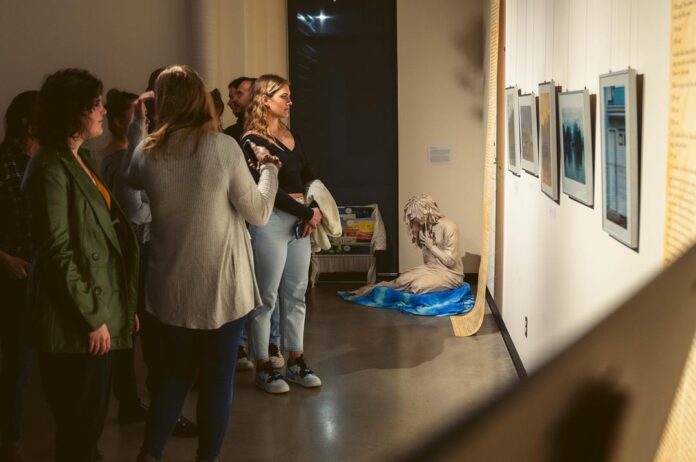Sydney Marchand, previously known as the managing editor for The Cascade, now the project manager and event coordinator for the 20 Harvest Challenge, is currently organizing an exhibition alongside creative director Michelle Superle. The exhibition in question: the Flood Stories project, has been in the works for quite some time.
“I’ve been working with [Michelle] since last January,” said Marchand, bringing to light her own experience with the project and how it came to be. “It started as a practicum position which moved into a work study position, which moved into a… student research assistant position. Now that I’ve graduated, it’s moved beyond that as well.”
The general aim of the project started as a response to the November 2021 floods, which resulted in the destruction of homes and displacement of several families. Farms turned to small lakes, households were forced to evacuate, and the effects of the flood will be felt for years. As Marchand described, “We wanted to give people a platform to be able to share their stories with what happened in the November 2021 floods in creative and expressive ways. So, giving people a chance to work through feelings and to also take back their stories through a narrative and expressive approach.”
“We also wanted to give a platform to showcase gratitude to farmers and people who were affected by the floods and continue to talk about it. No one talked about it after the last two weeks of news coverage, but at least from the people that I’ve interviewed over the year, [we’re] going to still be seeing effects from this 10 to 12 years down the road.”
As for what the behind-the-scenes has looked like, Marchand first described it as an evolution of hard work from the past year, and, in general: “It’s a lot of bouncing ideas off one another, and learning as we’re going (…) we just want to make sure that we are giving a respectful platform — if that makes sense — for the community. We just had our Reach gala opening last week, so it’s been nice to kind of wrap it up, even though it’s not done.”
Marchand, being at the back end of transcribing most of the interviews, described hearing pieces of each story as a collective impact. “Hearing about people who have lost family photos or who were trapped in their bedroom on their top floor eating salmon for a few days because that was all they could bring up. Losing followers or animals or the frustration that people had from being told to leave their farms, despite having 100,000 chickens there. There is an overarching emotion of being frustrated, being resilient, or being strong. (…) People are sad to lose family heirlooms. There’s a nostalgic component to that, but it definitely pulls at your heart. We hear a lot of frustration and then a lot of people saying that other people had it worse, but [we’re still] trying to validate people… [and] their stories are just as valid as the next person’s.”
“We’re excited to announce that we are partnering with the Climate Disaster Project with Sean Holman, who is a professor of Environmental and Climate Journalism [at UVIC]. We’re in the process of collaborating with his team and continuing to do [important work] for climate change.”
The Flood Stories project exhibition will run at the Reach Gallery from Jan. 27 to Mar. 18, and can be viewed as both an appreciation of community and a learning experience for the challenges farmers endured during the floods.
“We spent a week and a half setting it up with our team. There’s someone in there every day trying to make sure that it’s as good as can be. (…) We had a phenomenal turnout. A lot of people were saying the same thing, they didn’t realize how impacted people are, how impacted people still are.”


